人教版 八年级上 Unit 10 If you go to the party, you’ll have a great time! Section B 第4课时 课件 (共34张PPT)
文档属性
| 名称 | 人教版 八年级上 Unit 10 If you go to the party, you’ll have a great time! Section B 第4课时 课件 (共34张PPT) |  | |
| 格式 | ppt | ||
| 文件大小 | 23.4MB | ||
| 资源类型 | 教案 | ||
| 版本资源 | 人教新目标(Go for it)版 | ||
| 科目 | 英语 | ||
| 更新时间 | 2022-07-12 18:01:59 | ||
图片预览


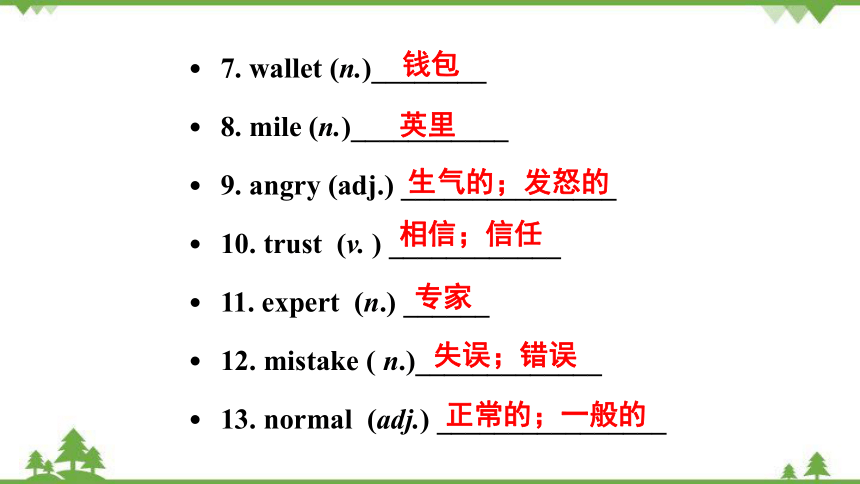


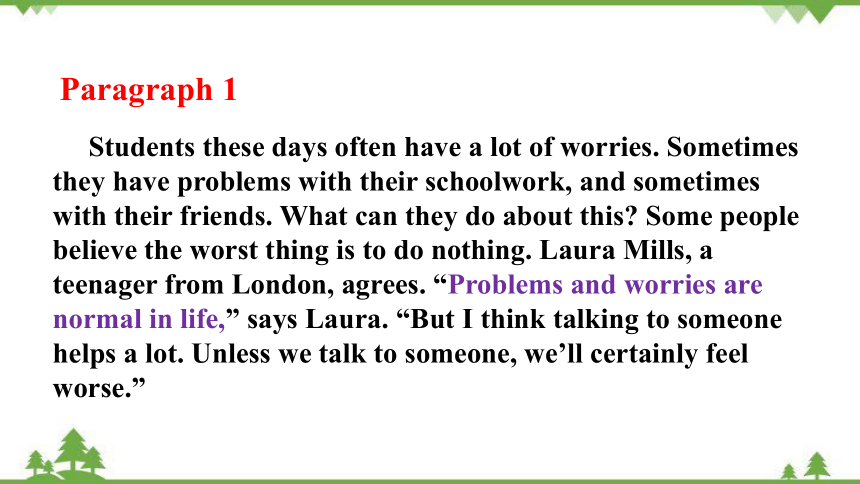
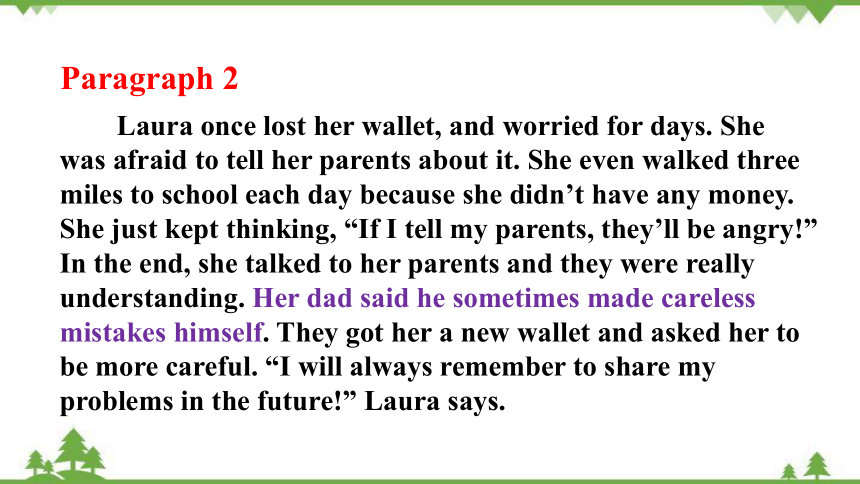
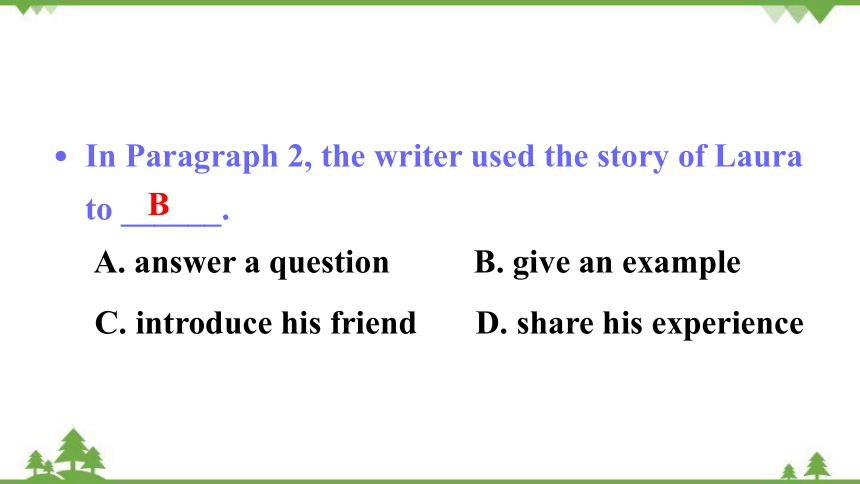
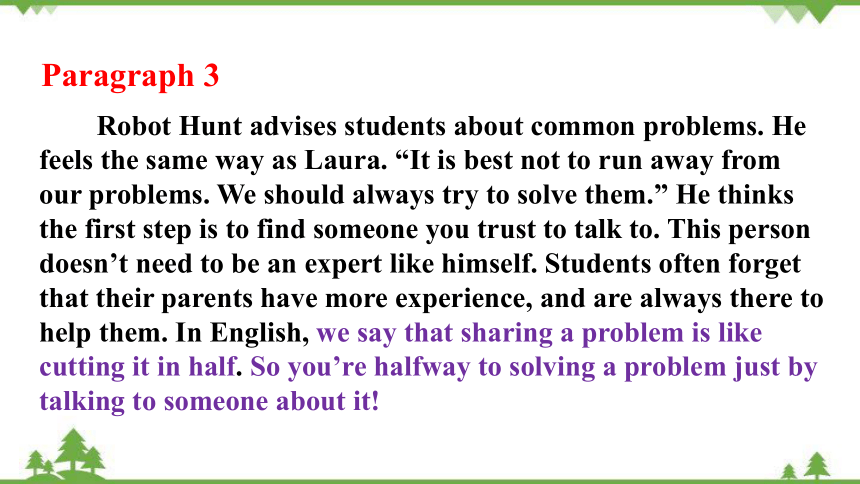
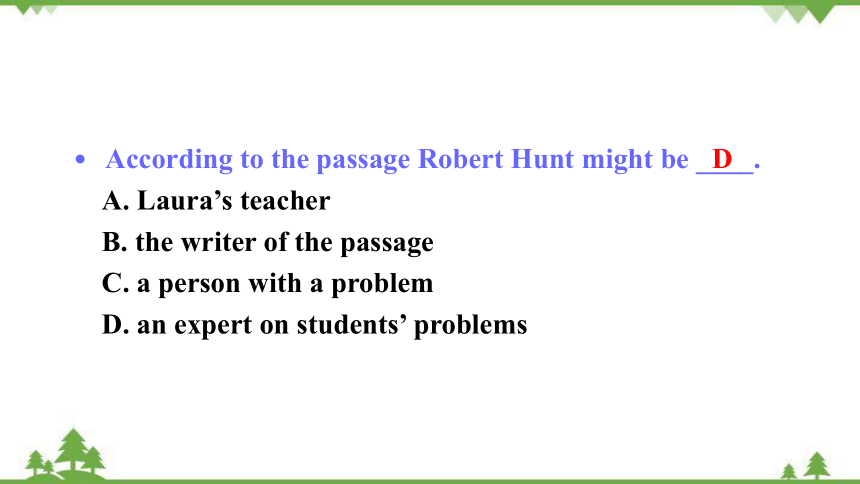
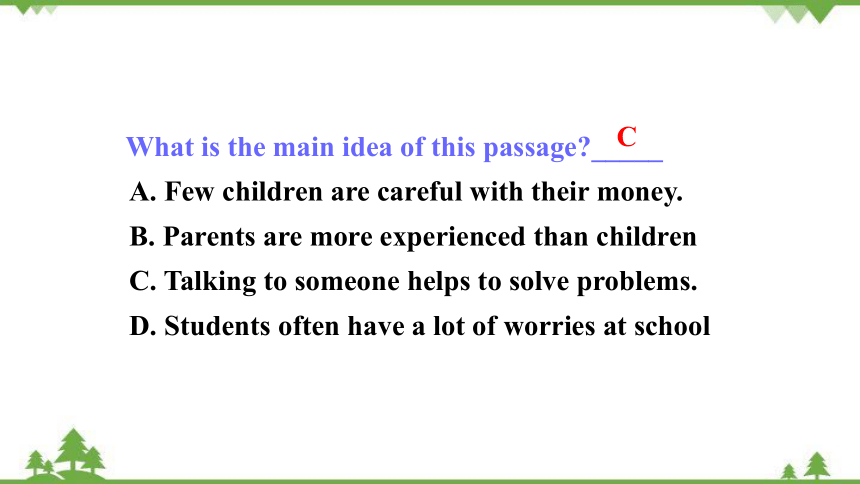

文档简介
(共34张PPT)
Unit 10 If you go to the party, you’ll have a great time!
R 八年级上册
Section B 第4课时
New words
1. careless (adj.)__________________
2. solve(v.)___________
3. understanding (adj.) ____________
4. careful (adj.) ________________________________
5. certainly (adv.) ______________________
6. teenager (n.)______________________
当然;行;无疑;肯定
小心的;细致的;精心的;慎重的
解决;解答
粗心的;不小心的
善解人意的
(13~19岁的) 青少年
7. wallet (n.)________
8. mile (n.)___________
9. angry (adj.) _______________
10. trust (v. ) ____________
11. expert (n.) ______
12. mistake ( n.)_____________
13. normal (adj.) ________________
英里
钱包
专家
正常的;一般的
生气的;发怒的
失误;错误
相信;信任
2a
What kinds of things do you worry about Who do you usually go to for help
schoolwork
friends
family
Look at the statements and then read the passage quickly. Which statement expresses the main idea of the passage
2b
b. If people have problems, they
should talk to other people.
c. If people have problems, they should
keep them to themselves.
a. If people have problems, they should
get advice from an expert.
√
Students these days often have a lot of worries. Sometimes they have problems with their schoolwork, and sometimes with their friends. What can they do about this Some people believe the worst thing is to do nothing. Laura Mills, a teenager from London, agrees. “Problems and worries are normal in life,” says Laura. “But I think talking to someone helps a lot. Unless we talk to someone, we’ll certainly feel worse.”
Paragraph 1
Laura once lost her wallet, and worried for days. She was afraid to tell her parents about it. She even walked three miles to school each day because she didn’t have any money. She just kept thinking, “If I tell my parents, they’ll be angry!” In the end, she talked to her parents and they were really understanding. Her dad said he sometimes made careless mistakes himself. They got her a new wallet and asked her to be more careful. “I will always remember to share my problems in the future!” Laura says.
Paragraph 2
In Paragraph 2, the writer used the story of Laura to ______. A. answer a question B. give an example
C. introduce his friend D. share his experience
B
Robot Hunt advises students about common problems. He feels the same way as Laura. “It is best not to run away from our problems. We should always try to solve them.” He thinks the first step is to find someone you trust to talk to. This person doesn’t need to be an expert like himself. Students often forget that their parents have more experience, and are always there to help them. In English, we say that sharing a problem is like cutting it in half. So you’re halfway to solving a problem just by talking to someone about it!
Paragraph 3
According to the passage Robert Hunt might be ____.
A. Laura’s teacher
B. the writer of the passage
C. a person with a problem
D. an expert on students’ problems
D
What is the main idea of this passage _____ A. Few children are careful with their money. B. Parents are more experienced than children C. Talking to someone helps to solve problems. D. Students often have a lot of worries at school
C
1. 如今学生有很多困扰。
Students these days often have a lot of worries.
2. 他们在功课上有问题。
They have problems with their schoolwork
(have problems with sth /doing sth )
3. 最糟糕的事就是什么都不做。
The worst thing is to do nothing.
Important sentences
4. 在生活中问题和困扰是很正常的。
Problems and worries are normal in life.
5. 倾诉对一些人说有很大帮助。
Talking to someone helps a lot.
6. 最好不要逃避问题。
It is best not to run away from our problems.
7. 我们应该试着解决。
We should always try to solve the problems.
8. 第一步找我们信任的人对他们说。
The first step is finding someone we trust to talk to.
9. 父母比我们有更多的经验。
Parents have more experience.
10. 找人去分担一个问题会事半功倍
Sharing a problem is like cutting it in half.
11. 她害怕告诉父母这件事。
She was afraid to tell her patents about it.
(be afraid to do sth.)
12. 从今以后我将记得分担我的问题。
I will always remember to share my problems in future .
2c
Read the passage again and answer the questions. Discuss your answers with a partner.
What is the worst thing to do if you have a problem
_______________________________________________________
2. Why didn’t Laura want to tell her parents about her lost wallet
_______________________________________________________
3. What is the first thing you should do when you want to solve a problem
_______________________________________________________
4. Why can our parents give us good advice about our problems
_______________________________________________________
To do nothing.
She was afraid they would be angry with her.
The first thing we should do is to find someone we trust to talk to.
Because they have more experience, and are always there to help us.
2d
Fill in the blanks with the phrases in the box.
Students often have a lot of problems
and worries. Laura Mills thinks the
worst thing is ____________. She thinks you’ll feel worse if you don’t ______________ about your problems. Laura remembers that she once lost her wallet and was afraid to ______________ about it.
discuss your problems
tell her parents
unless you talk
run away from
talk to someone
share her problems
to do nothing
to do nothing
tell her parents
talk to someone
Now she believes you cannot feel better ______________ to someone. She says she will always __________________ in the future. Robert Hunt agrees with Laura. He thinks you should not_______________ your problems, but you should try to solve them. If you cannot talk to an expert like Robert, you can ____________________ with your parents, because they have a lot of experience.
discuss your problems tell her parents unless you talk
run away from talk to someone share her problems
to do something
unless you talk
share her problems
run away from
discuss your problems
2e
Ask three students the following questions. Take notes of their answers.
1. What problems do you have with schoolwork
2. Who do you talk to about these problems and why
3. Who else can you get advice from
4. Do you always tell your parents about your problems
Why or why not
5. Do you ever give advice to your friends about their
problems What advice do you give
Language points
1.If people have problems, they should keep them to themselves.
如果人们有问题,他们应该把这些问题留给自己。
① keep...to oneself 意为:保守秘密, 把问题/烦恼埋在心底。
我们应该为他们的忧虑保守秘密。
We should keep their worries to ourselves.
② keep....to oneself 还可意为“不与人来往;不交际”
2.Sometimes they have problems with their schoolwork,
and sometimes with their friends.
有时他们有学业方面的问题,有时有朋友方面的问题。
have problems with… 在…方面遇到问题
相当于have trouble with/difficulty in sth.
一些老年人不适应城市的生活。
Some old people have some problems with the life in the city.
problem常用短语:
solve a problem解决难题
no problem没问题;不客气
health/financial/technical problem健康/财政/技术问题
3. She was afraid to tell her parents about it.
她害怕把这件事告诉父母。
be afraid to do sth.意为“害怕做某事” 。
常用的结构:
be afraid of sb./sth.“害怕某人或某物”;
be afraid of doing sth.“害怕或担心发生某种(意外)情况而不敢做某事”;
be afraid + that从句,意为“担心……”。
不要害怕提出问题!
Don't be afraid to ask questions!
4. Her dad said he sometimes made careless mistakes himself.
mistake后可接介词短语、动词不定式、现在分词作定语。接about表示“关于…的错误”,接in表示“某方面的错误”。
make a mistake 表示“犯错误”;
by mistake 表示“错误地”。
你的作文中犯了几处语法错误。
You've made several grammatical mistakes in the composition.
5.Robert Hunt advises students about common problems.
罗伯特·亨特就一些常见的问题给学生们提出建议。
advise sb. about/on意为“关于……给某人忠告/建议”。
advise sb.(not)to do sth.意为“建议某人(不)做某事”。
他就餐桌礼仪给那个小孩提了些建议。
He advised the child about table manners.
布朗夫人劝告我们吃健康食品。
Mrs. Brown advises us to eat healthy food.
6. It is best not to run away from our problems.
最好不要逃避我们的问题。
It is best (not) to do sth.意为“最好(不要)做某事”。其中it是形式主语,真正的主语是后面的动词不定式。相当于You'd better (not)do sth.。
最好每天说英语。
It is best to speak English every day.
7.He thinks the first step is to find someone you trust to talk to.
他认为(解决问题的)第一步是找一个你信任的人倾诉。
the first…为think的宾语从句,省略了引导词that。
在宾语从句中,含有定语从句you trust,修饰someone,因关系词作trust的宾语,故可省略。
8.In English, we say that sharing a problem is like cutting it in half.
在英语中,我们说与人分担一个烦恼就像把烦恼分成两半。
cut…in half 意为“把……分成两半”。
请把这个橙子切成两半。
Please cut the orange in half.
9. So you’re halfway to solving a problem just by talking
to someone about it!
你只要跟人聊聊这个问题,你的问题就解决了一半。
be halfway to… 表示“完成了或者做了事情的一部分”,其中to为介词
我们才仅仅完成了工作的一部分。
We’re still only halfway to finishing the job.
Exercise
( )1.This melon is too big for ____ of us. We should cut it
____ and share it.
A. either; in half B. neither; in half
C. either; in halves D. neither; into halves
( )2.All the students in Class 5 will climb the mountain if
it ____ rain tomorrow.
A. won't B. don't C. didn't D. doesn't
( )3.The sports meeting will continue ____ it rains this
afternoon.
A. If B. since C. as soon as D. unless
A
D
D
( )4.Sorry,I took your schoolbag by ____ .
A. mistake B. mistakes
C. mistook D. mistaken
( )5.—I'm going for a summer camp in Qingdao next month.
— ____ !
A. What a pity B. Not at all
C. Don't worry D. Have a good time
( )6.—My sister is going to eat more vegetables.
—If she ____ so, she will lose weight.
A. does B. doesn't C. will D. won't
A
D
A
( )7.—The air pollution is terrible.
—It will be worse ____ we take action to protect the
environment.
A. if B. unless C. until D. when
( )8.If people have problems, they should keep them ____
A. for them B. for themself
C. to them D. to themselves
( )9.Please cut the orange ____ .
A. in half B. half C. to half D. halves
( )10.We're still only halfway ____the job.
A. to finish B. to finishing
C. for finishing D. about finishing
B
D
A
B
Unit 10 If you go to the party, you’ll have a great time!
R 八年级上册
Section B 第4课时
New words
1. careless (adj.)__________________
2. solve(v.)___________
3. understanding (adj.) ____________
4. careful (adj.) ________________________________
5. certainly (adv.) ______________________
6. teenager (n.)______________________
当然;行;无疑;肯定
小心的;细致的;精心的;慎重的
解决;解答
粗心的;不小心的
善解人意的
(13~19岁的) 青少年
7. wallet (n.)________
8. mile (n.)___________
9. angry (adj.) _______________
10. trust (v. ) ____________
11. expert (n.) ______
12. mistake ( n.)_____________
13. normal (adj.) ________________
英里
钱包
专家
正常的;一般的
生气的;发怒的
失误;错误
相信;信任
2a
What kinds of things do you worry about Who do you usually go to for help
schoolwork
friends
family
Look at the statements and then read the passage quickly. Which statement expresses the main idea of the passage
2b
b. If people have problems, they
should talk to other people.
c. If people have problems, they should
keep them to themselves.
a. If people have problems, they should
get advice from an expert.
√
Students these days often have a lot of worries. Sometimes they have problems with their schoolwork, and sometimes with their friends. What can they do about this Some people believe the worst thing is to do nothing. Laura Mills, a teenager from London, agrees. “Problems and worries are normal in life,” says Laura. “But I think talking to someone helps a lot. Unless we talk to someone, we’ll certainly feel worse.”
Paragraph 1
Laura once lost her wallet, and worried for days. She was afraid to tell her parents about it. She even walked three miles to school each day because she didn’t have any money. She just kept thinking, “If I tell my parents, they’ll be angry!” In the end, she talked to her parents and they were really understanding. Her dad said he sometimes made careless mistakes himself. They got her a new wallet and asked her to be more careful. “I will always remember to share my problems in the future!” Laura says.
Paragraph 2
In Paragraph 2, the writer used the story of Laura to ______. A. answer a question B. give an example
C. introduce his friend D. share his experience
B
Robot Hunt advises students about common problems. He feels the same way as Laura. “It is best not to run away from our problems. We should always try to solve them.” He thinks the first step is to find someone you trust to talk to. This person doesn’t need to be an expert like himself. Students often forget that their parents have more experience, and are always there to help them. In English, we say that sharing a problem is like cutting it in half. So you’re halfway to solving a problem just by talking to someone about it!
Paragraph 3
According to the passage Robert Hunt might be ____.
A. Laura’s teacher
B. the writer of the passage
C. a person with a problem
D. an expert on students’ problems
D
What is the main idea of this passage _____ A. Few children are careful with their money. B. Parents are more experienced than children C. Talking to someone helps to solve problems. D. Students often have a lot of worries at school
C
1. 如今学生有很多困扰。
Students these days often have a lot of worries.
2. 他们在功课上有问题。
They have problems with their schoolwork
(have problems with sth /doing sth )
3. 最糟糕的事就是什么都不做。
The worst thing is to do nothing.
Important sentences
4. 在生活中问题和困扰是很正常的。
Problems and worries are normal in life.
5. 倾诉对一些人说有很大帮助。
Talking to someone helps a lot.
6. 最好不要逃避问题。
It is best not to run away from our problems.
7. 我们应该试着解决。
We should always try to solve the problems.
8. 第一步找我们信任的人对他们说。
The first step is finding someone we trust to talk to.
9. 父母比我们有更多的经验。
Parents have more experience.
10. 找人去分担一个问题会事半功倍
Sharing a problem is like cutting it in half.
11. 她害怕告诉父母这件事。
She was afraid to tell her patents about it.
(be afraid to do sth.)
12. 从今以后我将记得分担我的问题。
I will always remember to share my problems in future .
2c
Read the passage again and answer the questions. Discuss your answers with a partner.
What is the worst thing to do if you have a problem
_______________________________________________________
2. Why didn’t Laura want to tell her parents about her lost wallet
_______________________________________________________
3. What is the first thing you should do when you want to solve a problem
_______________________________________________________
4. Why can our parents give us good advice about our problems
_______________________________________________________
To do nothing.
She was afraid they would be angry with her.
The first thing we should do is to find someone we trust to talk to.
Because they have more experience, and are always there to help us.
2d
Fill in the blanks with the phrases in the box.
Students often have a lot of problems
and worries. Laura Mills thinks the
worst thing is ____________. She thinks you’ll feel worse if you don’t ______________ about your problems. Laura remembers that she once lost her wallet and was afraid to ______________ about it.
discuss your problems
tell her parents
unless you talk
run away from
talk to someone
share her problems
to do nothing
to do nothing
tell her parents
talk to someone
Now she believes you cannot feel better ______________ to someone. She says she will always __________________ in the future. Robert Hunt agrees with Laura. He thinks you should not_______________ your problems, but you should try to solve them. If you cannot talk to an expert like Robert, you can ____________________ with your parents, because they have a lot of experience.
discuss your problems tell her parents unless you talk
run away from talk to someone share her problems
to do something
unless you talk
share her problems
run away from
discuss your problems
2e
Ask three students the following questions. Take notes of their answers.
1. What problems do you have with schoolwork
2. Who do you talk to about these problems and why
3. Who else can you get advice from
4. Do you always tell your parents about your problems
Why or why not
5. Do you ever give advice to your friends about their
problems What advice do you give
Language points
1.If people have problems, they should keep them to themselves.
如果人们有问题,他们应该把这些问题留给自己。
① keep...to oneself 意为:保守秘密, 把问题/烦恼埋在心底。
我们应该为他们的忧虑保守秘密。
We should keep their worries to ourselves.
② keep....to oneself 还可意为“不与人来往;不交际”
2.Sometimes they have problems with their schoolwork,
and sometimes with their friends.
有时他们有学业方面的问题,有时有朋友方面的问题。
have problems with… 在…方面遇到问题
相当于have trouble with/difficulty in sth.
一些老年人不适应城市的生活。
Some old people have some problems with the life in the city.
problem常用短语:
solve a problem解决难题
no problem没问题;不客气
health/financial/technical problem健康/财政/技术问题
3. She was afraid to tell her parents about it.
她害怕把这件事告诉父母。
be afraid to do sth.意为“害怕做某事” 。
常用的结构:
be afraid of sb./sth.“害怕某人或某物”;
be afraid of doing sth.“害怕或担心发生某种(意外)情况而不敢做某事”;
be afraid + that从句,意为“担心……”。
不要害怕提出问题!
Don't be afraid to ask questions!
4. Her dad said he sometimes made careless mistakes himself.
mistake后可接介词短语、动词不定式、现在分词作定语。接about表示“关于…的错误”,接in表示“某方面的错误”。
make a mistake 表示“犯错误”;
by mistake 表示“错误地”。
你的作文中犯了几处语法错误。
You've made several grammatical mistakes in the composition.
5.Robert Hunt advises students about common problems.
罗伯特·亨特就一些常见的问题给学生们提出建议。
advise sb. about/on意为“关于……给某人忠告/建议”。
advise sb.(not)to do sth.意为“建议某人(不)做某事”。
他就餐桌礼仪给那个小孩提了些建议。
He advised the child about table manners.
布朗夫人劝告我们吃健康食品。
Mrs. Brown advises us to eat healthy food.
6. It is best not to run away from our problems.
最好不要逃避我们的问题。
It is best (not) to do sth.意为“最好(不要)做某事”。其中it是形式主语,真正的主语是后面的动词不定式。相当于You'd better (not)do sth.。
最好每天说英语。
It is best to speak English every day.
7.He thinks the first step is to find someone you trust to talk to.
他认为(解决问题的)第一步是找一个你信任的人倾诉。
the first…为think的宾语从句,省略了引导词that。
在宾语从句中,含有定语从句you trust,修饰someone,因关系词作trust的宾语,故可省略。
8.In English, we say that sharing a problem is like cutting it in half.
在英语中,我们说与人分担一个烦恼就像把烦恼分成两半。
cut…in half 意为“把……分成两半”。
请把这个橙子切成两半。
Please cut the orange in half.
9. So you’re halfway to solving a problem just by talking
to someone about it!
你只要跟人聊聊这个问题,你的问题就解决了一半。
be halfway to… 表示“完成了或者做了事情的一部分”,其中to为介词
我们才仅仅完成了工作的一部分。
We’re still only halfway to finishing the job.
Exercise
( )1.This melon is too big for ____ of us. We should cut it
____ and share it.
A. either; in half B. neither; in half
C. either; in halves D. neither; into halves
( )2.All the students in Class 5 will climb the mountain if
it ____ rain tomorrow.
A. won't B. don't C. didn't D. doesn't
( )3.The sports meeting will continue ____ it rains this
afternoon.
A. If B. since C. as soon as D. unless
A
D
D
( )4.Sorry,I took your schoolbag by ____ .
A. mistake B. mistakes
C. mistook D. mistaken
( )5.—I'm going for a summer camp in Qingdao next month.
— ____ !
A. What a pity B. Not at all
C. Don't worry D. Have a good time
( )6.—My sister is going to eat more vegetables.
—If she ____ so, she will lose weight.
A. does B. doesn't C. will D. won't
A
D
A
( )7.—The air pollution is terrible.
—It will be worse ____ we take action to protect the
environment.
A. if B. unless C. until D. when
( )8.If people have problems, they should keep them ____
A. for them B. for themself
C. to them D. to themselves
( )9.Please cut the orange ____ .
A. in half B. half C. to half D. halves
( )10.We're still only halfway ____the job.
A. to finish B. to finishing
C. for finishing D. about finishing
B
D
A
B
同课章节目录
- Unit 1 Where did you go on vacation?
- Section A
- Section B
- Unit 2 How often do you exercise?
- Section A
- Section B
- Unit 3 I'm more outgoing than my sister.
- Section A
- Section B
- Unit 4 What's the best movie theater?
- Section A
- Section B
- Unit 5 Do you want to watch a game show?
- Section A
- Section B
- Unit 6 I'm going to study computer science.
- Section A
- Section B
- Unit 7 Will people have robots?
- Section A
- Section B
- Unit 8 How do you make a banana milk shake?
- Section A
- Section B
- Unit 9 Can you come to my party?
- Section A
- Section B
- Unit 10 If you go to the party, you'll have a grea
- Section A
- Section B
